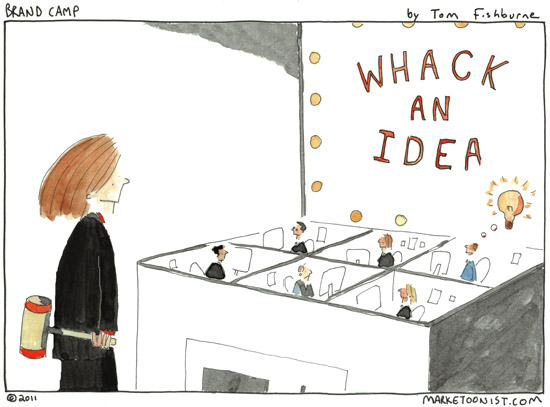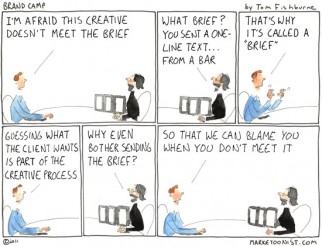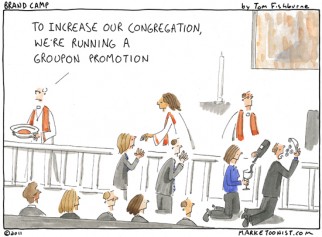So much of management is Whack-A-Mole, the classic arcade game where you club moles that pop up randomly. As soon as you’ve whacked one problem, another rears its head.
I’m speaking at an innovation conference this week in Silicon Valley. It struck me that the trouble-shooting mentality in management is related to the idea-shooting mentality that is so common in innovation. It’s easier to whack an idea than to grow one.
When a business culture plays Whack-An-Idea for too long, it no longer needs to use the mallet. The culture begins to self-edit. Ideas that seem too risky are discarded out-of-hand.
Companies either have a Whack-An-Idea culture or a Grow-An-Idea culture. Employees instinctively know which and act accordingly.
(Marketoonist Monday: I’m giving away a signed print of this week’s cartoon. Just share an insightful comment to this week’s post. I’ll pick one comment at 5:00 PST on Monday. Thanks!)



Copywriter Kevin Francis says
Tom,
As you say, it’s all about the culture. An independent businessman or solo entrepreneur will be prepared to take a chance on what might seem a wild idea. If it pays off, great. If not, well move on to the next one. Not many companies are prepared to tolerate “serial failure” like that.
People behave according to the rewards and incentives in the “system” they find themselves in. All too often, the people who get rewarded in big corporations are the ones who play the politics most effectively.
Thanks for another great cartoon. They always bring a welcome smile!
Kevin Francis
Lynn Walsh says
Hi Tom
Unfortunately I’ve seen more Whack-An-Idea cultures than Grow-An-Idea cultures. Your image has me thinking of the perverse pleasure gained from playing Whack-a-Mole. I’m imagining those with status recognising the wretched ideas and ready to pounce before the creator even thinks to leave his or her seat. How disappointing when the moles choose to stay blind and in the dark where they belong…..
Rose Carlson says
Arcade memories; Lynn I can see your image clearly!
It is about culture. Unfortunately, even in a Grow-an-Idea culture it can be difficult to not self edit ideas based on current situations, manufacturing capabilities, etc. In my working group, we have innovation meetings semi-regularly, and in those there is a strict no-editing of your own or anyone else’s ideas to encourage the ‘idea moles’ to come out of hiding. Often times the carziest ideas that would have been immediately shot down will spark really wonderful, actionable ideas that may never have come to light otherwise.
I think both cultures are important so that time and energy is not wasted on unrealistic goals, but they need to be seperated if there is to be a chance for something new.
Paul Hobcraft says
Whack Management 2.0, solving round pegs in square holes with a mallet……firmly.
David says
Whack-a-Mole is truly a fun game, but only for so long… After a while, the mallet starts to get heavy and your fervor for “whacking” slows down as you realize you are mindlessly beating down something that has done nothing more than show its face.
Maybe someone should invent “Kiss-a-Mole” instead. Would need some good disinfectant between games; but in the same sense that we as management should be embracing (or “kissing”) new ideas, I bet it would be more fun, less tiring, and doubly rewarding to watch what happens when we do.
Beth Glassman says
Tom,
This is a great one! You literally nailed the culture in most companies. Frustrating, but still happy to have a job!
Beth
David Roche says
It seems to me companies that foster a “Whack A Mole” culture suffer from focusing on what is urgent at the expense of what is important. There will always be issues that crop up that need to be addressed, but the companies who are successful in the long run develop a strategy and spend the bulk of their energy executing that strategy – not diverting resources to address unrelated, but urgent requests.
duncan wardle says
“If I had a mole for every idea that got whacked…. That, said, ideas can easily be re-purposed. As Thomas Edison once said, ” I have not failed. I’ve just found 10,000 ways that won’t work.”
Greg Ortbach says
Tom,
Great pic!
If I might add, from a customer service perspective, isn’t listening to each and every “mole” also important? I agree with with the other folks that growing an idea has to start somewhere. Let’s stop spraying and praying.
Greg
Scott D says
Reducing the whack-an-idea tendency requires a very clear understanding of why your company exists and what you hope to accomplish – what the ‘new world’ looks like because your company has done something important (even if its just a small-scale something).
Defining this is the step that most companies have a hard time with. The answer cannot be a business metric, it must be a philosophy that you pursue… one that lets your company add value so well you make money too. Rational people will feel silly searching for philosophical purpose within a business environment. But without a meaningful end-goal, management won’t be able to tell what is a good idea and what is a bad idea, because no one will agree on where they’re trying to go in the first place. In situations like this, management will only pay attention to those ideas that look familiar (aka the ideas based on its current business identity). That’s not going to lead to innovation, just incremental improvement. And a whack-an-idea culture.
Jay Nussel says
I agree that ideas often get pre-maturely squished and an organization is the worse off for it. But let’s give some credit to management in this regard: if every employee is off digging new tunnels for their own moles, then focus is missing. One difference between good and bad management is the ability to discern those moles that can lead to bigger and better things vs. those moles that just eat up your lawn and leave a mess behind.
Jay
Suzanne Pecore says
Tom,
Insightful, as ever. Relevant to my world of product testing as well. We often “whack” a product because of poor ratings, but don’t always take the time to understand why. We just move on to optimize the top scoring products.
On a tangent, sometimes the kernel of an insight is among those consumers that “whack” your product, particularly among those that give it a really good whack. Understanding the whys behind the strong whacks has proven very useful.
Suzanne
Michael says
Pretty Funny – I often find that that good ideas get whacked by senior management not becuase the ideas are not good – but because senior management does not want the result of what could come to light as a result of the idea. For instance taking steps to instill a rigourous program evaluation culture might seem like an obvious good idea – but from senior management’s perspective – having access to the results of good program evaluation implies that they will now be accountable to having to react. Sometimes ignorance is bliss and a lot of good ideas are shot down because senior management are too busy already to deal with anything new. Great cartoons – keep em coming – appreciated!
Heather says
What a great cartoon for a Monday!
This one “hit” home for me in more ways than one! I’ve found this mentality to be true from large corporations to small businesses. No matter what the business size, it seems we’ve been programmed to operate on a constant “caution – danger ahead” mentality. And unfortunately, the fears are often not real and we miss out on potentially valuable opportunities. Both professionally and personally, in order to learn and grow we need to take some risks and not play it so safe. Just think of what would be missed out upon if the caterpillar never left the safety of its cocoon and journeyed out into the unknown?
On a lighter note, the analogy did make me think… if the one with the mallet is the “whacker”, does that make those with the ideas “whack-ee” (wacky)! LOL
Ricardo dos Santos says
Tom,
As an innovation management champion at my company, I certainly noticed that some people have a ‘find a flaw’ mentality while others have a ‘build upon’ mentality and encourage almost any new idea they encounter. I’d argue that this in itself is neither good nor bad. It’s mostly about the receiver of this feedback – unsuspecting or unprepared intrapreneurs may get unecessarily discouraged or encouraged by feedback. What’s important is to train intrapreneurs on what makes a great business model and successful theories of innovation strategy so that feedback can be properly digested as either potentially disproving (the negative feedback) or proving (the positive feedback) a certain hypothesis. One can of course ‘teach’ everyone in the company on how to carefully deliver feedback and use the interations with intrapreneurs as teaching moments.. I’ve found it more practical to prepare the intrapreneurs for the various types of personalities they are likely to encounter and embrace all styles of feedback, because hearing the glass half-empty can add as much value as the glass-half full story – everyone in a given company usually wants what’s best for the group as a whole, but will stay true to their personality types.
Ricardo dos Santos
P.S. There are better ways to approach any feedback session in general, such as asking people how to make the idea better, not asking if they like it or not; And besides teaching entrepreneurs the proper frameworks for understanding and designing innovations, it is good to offer coaching on internal feedback interactions (I’ve initiated an internal startup bootcamp, for example, to deal mostly with the issue you pose here)
Mike Westervelt says
You need a bigger mallet!
Henk Roodt says
Lovely observation and cartoon. Organisations are complex adaptive systems according to many researchers and thinkers out there (Ralph Stacey, etc.). The system is a result of the things people do, and I have seen how this can have interesting effects in organisations. One department has a whack-an-idea culture and another nurtures new ideas and you see how one flourishes and another slowly turns into an ugly mess. There is a second aspect, and that is the one of not only nurturing ideas, but also to have an effective way to allow only the best of those the resources to be winners. It takes time for that sub-system to become self-regulating, without becoming whack-an-idea at lower levels. Open processes to move winning ideas forward seem to work best, and it relies heavily on mutual respect and trust. Have seen it in action and have seen it work, only once, but it can be done.
Cheryl says
This cartoon speaks volumes. The most important take away for me is the importance of resilience. Lacking the “grow an idea” culture, or more broadly, a supportive network for your creative work, the creative person must persist, for their own sake. When the eventual mallet does show up and smack things down, like the mole in the arcade game, the creative person has to just keep popping up.
tomfishburne says
Hi all,
I spent most of yesterday on airplanes so didn’t get a chance to review this fully until now. What a great dialogue about that tension between creativity and management control. This week’s cartoon print goes to Ricardo. I agree that ultimately the responsibility in a whack-an-idea culture resides with the individual intrapreneur to make the idea happen. They need to navigate the idea killers and keep advancing ideas, even as the mallet falls. It’s like the old adage, “you can either carpet the world, or wear shoes.” The example of the intrapreneur who manages to navigate “whack-an-idea” is sometimes the catalyst needed to start evolving the culture to “grow-an-idea”.
Many thanks everyone! -Tom
James C says
Hi Tom,
Really enjoy your weekly Marketoon moments. As a marketer we can all relate to the frustrations of ‘idea-squashing’. It is far easier to trample an innovative idea than to foster it and let it grow. Managers need to remember this for those of us that work in areas where innovation is vital for future success.
My insight for you is a rcent gripe I had when managers do not listen to or accept the research from consumers, rather they champion their own n=1 beliefs choosing to put their personal view ahead of consumers. It is fruaght with danger!
Regards,
James